By Kole Odutola
We were all in Cologne from May 31 to June 3 to discuss the great continent of Africa. How can Africa be on the menu and decolonisation and the long-term effect of colonisation among many other topics are not side dishes. The conference started with the production of knowledge and how we all have fallen short in telling the story of Africa. Are you surprised that most African scholars are still unable to get up from their slumber? At Cologne, instead of the strident call for monuments must fall and activists must crawl, we had scholars asking that Nyasani must rise on walls. His image must be up to inspire. Now the fire is lit, and the heat turned on in Cologne where we all must symbolically bury colonial thoughts.
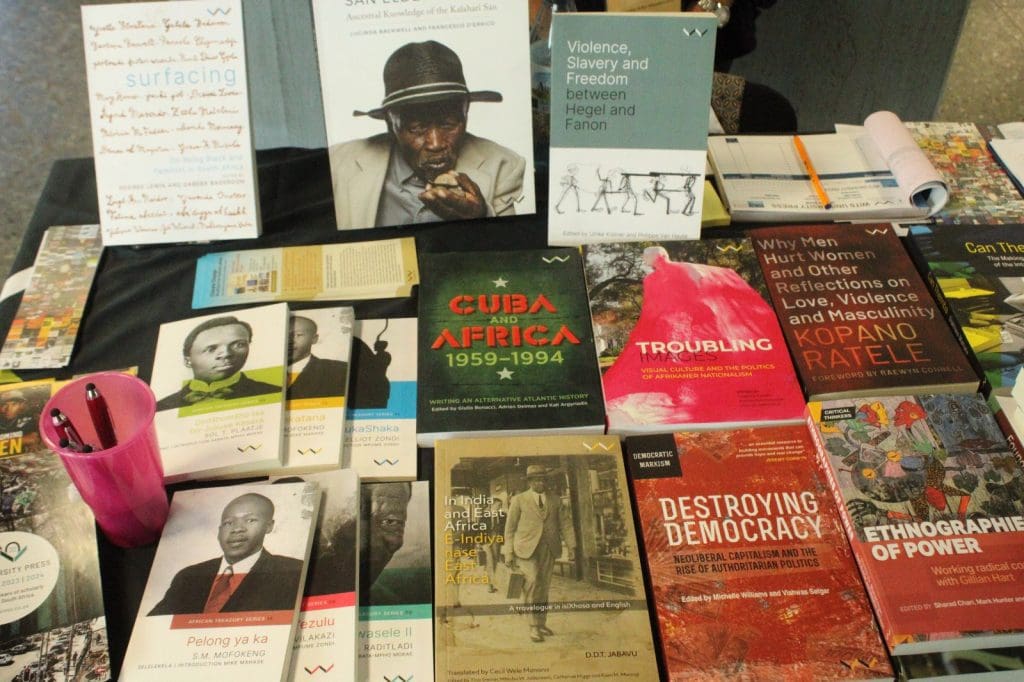
THERE is a Yoruba saying that darkness does not separate respectables in the society — okunkun ko mo eni owo. That was the situation when I chanced by the president of Goethe Institut, Professor Dr. Carola Lentz among those who had come to the opening reception. There were neither aides nor a routine of staff attending to her needs. Something in me felt she was one of the very important guests and I said that to her hearing. She smiled and flashed out her business card. It was much later that I realised the presence of the person I was. How do you position a person whose scholarship includes ethnicity, nationalism, colonialism, politics of remembrance, middle classes in the Global South, and labour migration. In addition, she conducts field research first in South America and since 1985 has regularly visited West Africa. One of her listed publications, Imagining Futures: Memory and Belonging in an African Family (published in 2022) gives one the idea that her ideas might have contributed to the theme of the conference. Who knows?
This 9th European Conference on African Studies was not just a marketplace of ideas; it was a supermall of well-researched thoughts and projections. According to the organisers, the “conference brought together over 2000 delegates from 80 countries, delivering 1470 papers across 245 panels/roundtables.” Unlike other conferences where scholars double as conference managers, this one was different. The mammoth gathering was managed by a professional outfit. NomadIT (Events Ltd) are administrators of academic professional associations and organise various academic conferences. The presence of this professional group must have allowed the host department at the University of Cologne pay closer attention to all the minor details that have great potential of derailing a large conference such as this.
If the organisation was that smooth, the various panels were executed with clockwork efficiency. As the Chinese say, making choices could be a chore. To decide which panel to attend I relied on the directions of colleagues I could buy an old automobile from. I did not need to throw dice to help decide which panel would retain my attention. Dr. Anthony Otome Okeregbe, a Senior Lecturer in the Department of Philosophy, University of Lagos (UNILAG), and also Principal Investigator, Lagos African Cluster Centre of Excellence (ACC) of the Africa Multiple Cluster of Excellence, University of Bayreuth, Germany, led me to the valley of still waters where politics and humor were on offer.
The panel was convened by Laura Martin of the University of Nottingham and Daniel Hammett of the University of Sheffield. The idea behind the panel was to focus on humour as inevitably political. In their conceptualisation “politics is part and parcel of humour. In previous decades, literature on the intersection of humour and politics in Africa has frequently been framed around an understanding of humour as a forum for and expression of resistance. This focus has meant that other types of political work and agency of humour, and the multitude of spaces in which it circulates, have often been overlooked.” There is no prize for guessing which samples of humour from Nigeria made it to this panel.
The paper by Dr. Laura Martin examined the role of women in different comedic realms across Africa. She and her co-author, Dr. Izuu Nwankwọ, argued that “women’s agency in humor production has always been present but with the rise of social media, it is also becoming more visible thereby transforming gendered agency in popular culture.” The panel was no laughing matter but there were loads of funny moments from Dr. Martin and her ability to throw up her hands as she threw in creative lines like an intellectual stand-up comedian.
APART from well-researched papers and panels, there was the official opening which brought the top brass of the campus and the city. A welcome address was presented by Prof. Dr. Dr. h.c. Axel Freimuth, Rector of the University of Cologne. As expected, he was glad that we all converged on their campus at a time the city was celebrating Africa. In truth, everywhere we turned there was something commemorating Africa. For instance, the “AfriCologne” Theatre festival was taking place in Cologne from June 1 to 11. Same for different Museums in the city that rolled out the drums.
The President of the Association of African Studies in Europe, Dr. Amanda Hammer gave vivid statistics of the membership. There are close to 40 institutional members of the Association. Apart from statistics she gave a brief history of the biannual conference which started in 2005. Her closing conclusion was to wish the participants a “truly enriching conference, grounded in open-mindedness and open-heartedness.”
That wish was put to the test a few moments later when seven Africans mounted the stage to discuss, “Is there a Future for African Studies in Europe?” The moderator, Ms. ShaNon Bobinger showed that she is a well-grounded media presenter and systemic life and business coach. The way the panel was handled was such that a few of us who sat at the edge of our chairs felt a sense of relief at the end of the discussions.
There really was no need to have felt uncomfortable because the brief in the programme already asked all the hard questions. “It seems contradictory, certainly at first sight. Can a European Conference on African Studies wiggle itself loose from the colonial past? Can one claim to offer spaces for encounters, knowledge transfer, and an open exchange of ideas among scholars – from all parts of the world – in a context stained by growing bigotry and racism, by new walls being erected and visas denied? Did we enter a new era of epistemological nationalism? What does this mean for the future of such forms of academic exchange as ours? What is the consequence of the ongoing political and social change in the environment of scientific and scholarly work in a world that we would all like to see as being decolonized, but which isn’t?”
To those who are familiar with Nollywood productions, sequels are not unexpected. Along the Nollywood format, it was suggested that another question needs be addressed: Is there a Future for the study of African Languages in Europe? So much was said and so many questions were raised. There was a camp that passionately believed that a conference of this magnitude be held on the African continent. Yet, there were those who thought that African scholars should maintain their lane but extend hands of fellowship to all who can assist in the creation of home-grown ideas. As with all conferences, the night ended with drinks, snacks, and socials. Masello Motana’s The Vocal Museum supplied the Live Performance with Band.
In her performance and sound documentary, this South African singer, actress, and performance artist Masello Motana took her audience on a ”tour of South African history, from the founding of the African National Congress in 1912 to apartheid politics and resistance struggles for land rights that continue to this day.” She and her band played songs that are not only central to the collective memory of the townships but have played an important role in black empowerment worldwide.
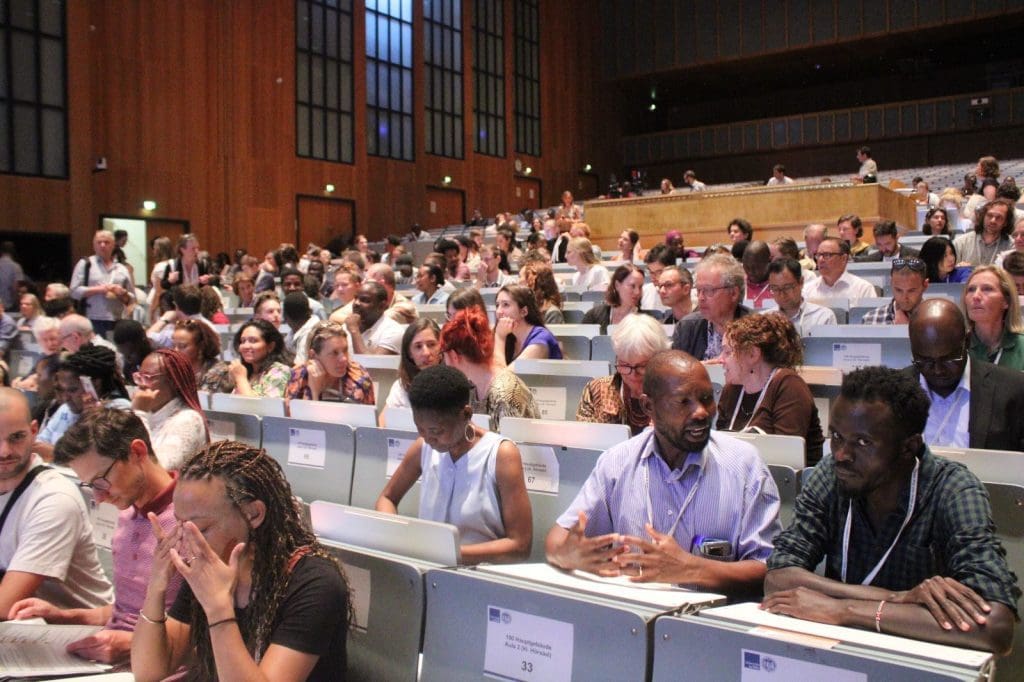
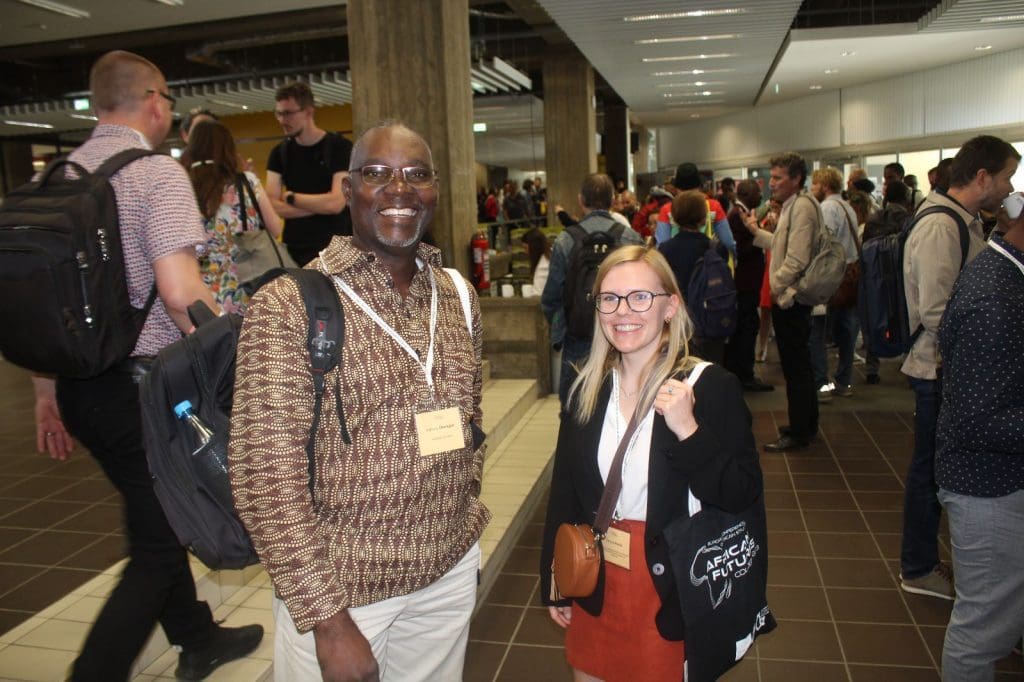
Day 2
IT appeared that the roundtable panel of the previous day was a dress rehearsal. Professor Friederike Lüpke of the University of Helsinki and Vincent Hiribarren of King’s College London, also convened a panel to discuss if “(European) African Studies (is) obsolete, or does it have a future as a critical convivial space and as a place from which African knowledges can be mainstreamed? “ I am willing to bet my next pay that this panel delivered on its terms because of the convenors. Most of the presenters on the panel were from universities in Europe unlike the solely African presenters the previous day.
The lecture on offer during the afternoon session was one that touched me in more ways than I can bother to list. The brief for the lecture and audience participatory engagement said it all.
“We cannot be able to talk about African Futures if we do not speak about the African past and the achievements of those who came before us and set a footprint. When we include the narratives and stories of African scholars within German Academia, we are not only in the process of decolonizing this university but also producing relevant knowledge. By making these narratives visible we are rewriting these African scholars back to the academy making these hidden histories visible.”
Dr Rahab Njeri did not only choose to speak about Prof. Joseph Major Nyasani; she also brought her mother along to give her own testimony about the individual who was the subject of discussion.
So, who was Professor Joseph Major Nyasani? He was the first African student to write his Ph.D. thesis in Latin at the University of Cologne and broke a 300/100-year-old record in 1969. As I recounted in my opening paragraph, instead of monuments must fall and activists must crawl, scholars from different disciplines are asking that Nyasani must rise on various walls on campus. His image must be up to inspire. Now the fire is lit, and the heat turned on in Cologne. As we left the venue the words of Ama Ata Aidoo rent the air “Humans, not places, make memories”.
During the lunch periods there were book launches or what we now prefer to term book presentations. The chosen titles and subjects of the books are not only intellectually interesting but some raise one’s curiosity by a notch or two. There is a book by Karen Tranberg Hansen on “Dress Cultures in Zambia: Interwoven Histories, Global Exchanges, and Everyday Life.” Then another by Tichaona Mazarire titled “Exploring Economic Reintegration in Namibia. Individual Trajectories of PLAN Ex-Fighters and SWAPO Exiles, 1989–2018.” How many teeth of the mythical ‘Adepele’ can we count? The book “Concrete City: Material Flows and Urbanization in West Africa” drew my attention as well. Did I buy any of the books? If you are not in a hurry, the answer shall be provided in my dream.
One of the highlights of Day 2 was the meeting of Edinburgh Circle on the Promotion of African Languages which was formed at the 2019 European Conference on African Studies in Edinburgh. Its members believe that increased use of African languages in formal domains is key to development and is practically possible. At the open meeting, the Steering Committee, composed of Dr. Taiwo Oloruntoba-Oju and Dr. Bert van Pinxteren gave a brief presentation on current and planned activities and asked for input from those of us in attendance. It was at that meeting I met Dr. Gardy Stein , of the University of Hamburg. She is a scholar devoted to life-long learning in the fields of languages, linguistics, communication, culture, and music. Currently, she holds a PostDoc-position at the Institute for African Studies at the Universität Hamburg. Her Hausa may not sound as good, but she is miles better than mine. The fascinating aspect of her scholarship is her interest in the use of music in the teaching of languages; it automatically became our magnet.
I am not sure if it was Chinua Achebe who first brought the idea of watching a masquerade to our consciousness but the words that one who must watch a masquerade cannot stay in one spot rang true. It captured our mass movement by foot, by train, and by tram to the next venue.
The location of the venue is called, the “Carlswerk” in Cologne. It is a former factory turned into a cultural institution and site. Does this in any way remind you of Freedom Park on Lagos Island? It has an adjacent “Carls Garten” which is a perfect place to enjoy a bit of the sun (should it decide to show up) and greenery before and after the performances. We were rightly informed that the surrounding neighbourhood of Cologne Mülheim offers a variety of culinary treats, most notably along Keupstraße which is almost entirely made up of Turkish and Kurdish shops and restaurants and is known throughout Germany as a vibrant centre of multicultural business activity. As you well know, if you get to a place and meet no enterprising Nigerian, please keep moving. Yes, there was Nigerian Jollof at a cutthroat price. After my consultation with my purse, I knew what to do and yes, you guessed right. I held a rapid dialogue with my legs!
Our main business at the Depot as it is also called was the welcome address by two important dignitaries as we will frame them in Nigerian parlance; mayor of Cologne Henriette Reker (who was represented by a male colleague) and the Rector of the University of Cologne Prof. Dr. Dr. h.c. Axel Freimuth who had earlier addressed us. To cap the night nicely, Yvonne Adhiambo Owour (with the kind support of the Jutta Vogel Foundation) gave almost a 70-minute-long keynote entitled “Inscribing African Futures – from the Continent to the Galaxies.” Something in her presentation did not go down well with one of the local media outlets and it was made known to their readers in German.
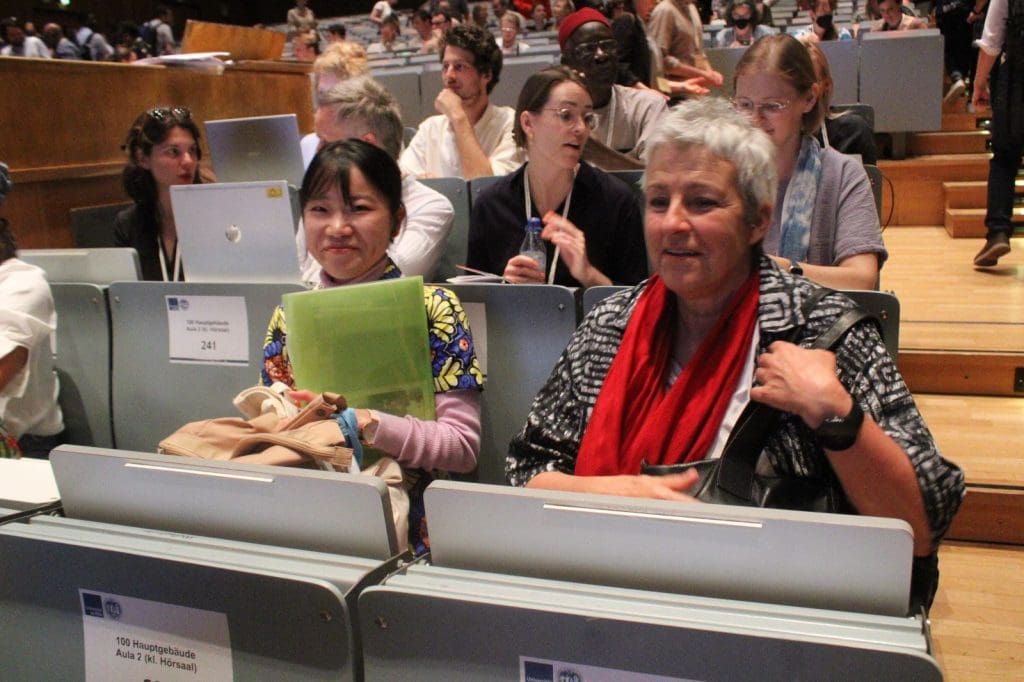
Day 3
IT was on this day that I had to press into service that Yoruba saying which translates loosely as’ non-presence begets nonparticipation’ (aibawon de ibe ni aibawon dasi). I was present and I gave my presentation on “Nature in ecopoetry and the nature of ecopoetry.” The panel- “African literature of the environment in the 21st century” was convened by Dr. Chinonye C. Ekwueme-Ugwu, Department of English and Literary Studies, University of Nigeria, Nsukka, and Dr. Joyce Onoromhenre Agofure who is a Postdoctoral Fellow, and Lecturer at the Department of English and Literary Studies, Ahmadu Bello University, Zaria, Nigeria. Unfortunately, Dr. Ekwueme-Ugwu could only join us via Zoom. Her virtual presence did not in any way reduce her participation in any shape or form. The consultants from NomadIT were always on hand to troubleshoot and, there were many such instances. The focus of the panel was an exploration of “ecocriticism in African Literature and an evaluation of the position of African ecocritics. It evaluated convergences and divergences in theoretical and methodological views from African and African diaspora ecocritics, environmentally conscious authors and critics.”
During my presentation, I made a sweeping statement that Euro-American children sing ‘Rain Rain go away come again another day’ as against what Yoruba children sing, Ojo maa ro, itura lo je (rain keep falling as you are a source of comfortability). To my pleasant surprise, a post-graduate student, Megan, from Leeds University approached me after my presentation to say that she is from South of California, and they sing “Rain rain come and stay; Don’t you wait another day.” This is one of the advantages of attending conferences with people from various backgrounds.
Elisabeth Knittelfelder of the University of Vienna addressed “Environmental Disruption in Contemporary African Short Fiction.” Coincidentally, one of the short stories she chose was about Rain. There was also a presentation on Rhinos, Romanticism, and the Restor(y)ation of Zululand: Eye Brother Horn by Jean Rossmann and Beverley Jane Cornelius (both from the University of KwaZulu-Natal). During their presentation, it was pointed out that babies appear to show up in most South African creative expressions. Their retort to the observation is that maybe this is so because South Africa is a baby nation in terms of independence.
Joyce Agofure’s presentation was on “Exploring African Ecocriticism in African Literary Texts.” Once again Niyi Osundare’s works came up during her presentation. There was a new take on Chinua Achebe’s ‘Things Fall Apart‘ during Ekwueme-Ugwu’s presentation, “Transcending Ecological Archives: Unoka’s Losses and Umar-Faruq’s Gains.” In a nutshell, she focused on the “inherited rift between art and science [as] a threat to a sustainable future of environmentalism in African literature. Her paper advocated for a shift of emphasis, from the archives to experiential encounters with nature; for a regime of getaways into the real world that literature recreates.”
As a retired Botanist, it would have been a crime in my own books if I did not attend the panel on Biodiversity and Food Security. The members of the panel were thorough-bred scientists who know their onions. The roundtable discussion was “set against the backdrop of the United Nations Biodiversity Conference (CBD COP 15) agreement of putting 30 percent of the planet and 30 percent of degraded ecosystems under protection by 2030. Whilst this is a bold step toward significantly reducing the loss of biodiversity, it may require new answers to the question of how to ensure food security worldwide.” Their various views took me to my time at the Nigerian Environmental/Action Team (NEST). The days of privileging local/indigenous knowledge and the creation/protection of local germplasm. I was surprised that 20 or more years after these were still ‘fresh’ discussions. Dr Irit Ittner, Senior Researcher, German Institute of Development and Sustainability (IDOS) did a wonderful job of moderating the panel, which was made up of Dr. Godfrey Tawodzera, University of the Western Cape; Arno Bratz, Head of Sector Strategy, Knowledge and Learning, Welthungerhilfe (WHH); Prof. Michael Bollig, Institute for Social and Cultural Anthropology, Speaker for the Global South Studies Centre Cologne, University of Cologne and Dr. David Lerch, Head of Food, Food Security & Product Supply Communications, Bayer AG. What an evening that turned out to be for a teacher of Yoruba language.
IT is impossible to capture an enriching four-day event in one fell swoop, but I had to show up at the museum in town for European-African b/or/ders – Back to the future? The stories told by asylum seekers were heart-rending. One of the participants recounted what came across to me as the most painful story I have heard in a long while. She was infected with HIV/AIDS as a child and when she crossed the borders, the doctors refused to give her the needed medicine because she was regarded as an undocumented immigrant. Thank goodness all that is in the past!
To be fair, this conference was not all about serious issues about a bruised past and an unstable present. There are researchers working on issues such as “African Cannabis futures” if put differently they may be looking into the future of weed in healthcare and recreation. I hope someone in the panel recalled Fela Kuti’s “Ogogoro dey make dem craze but Igbo dey make dem straight.”
In one of the entries in my diary, I recalled when I was growing up at Bola Street, Ebute metta, every “Soft Drink” was Coca-Cola, now, every performance artist is likely to be Jelili Atiku. The man who performs like people from the outer world. I met another Jelili Atiku in Cologne, I did not ask about this form of art, but I just did what I know how to do best. Take pictures and go my way.
No matter what I do from now on, the proceedings of this conference will not go away. It was an enriching four days of meeting people, and listening to intelligent discussions about Africa, the continent of a million stories and mysteries.
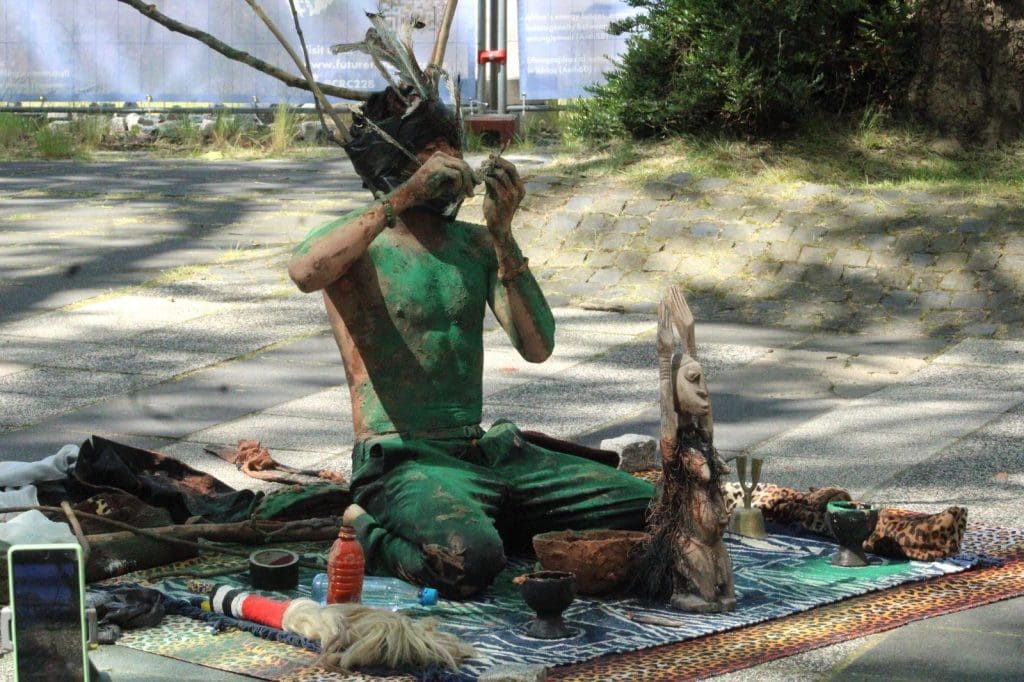






Comments are closed.